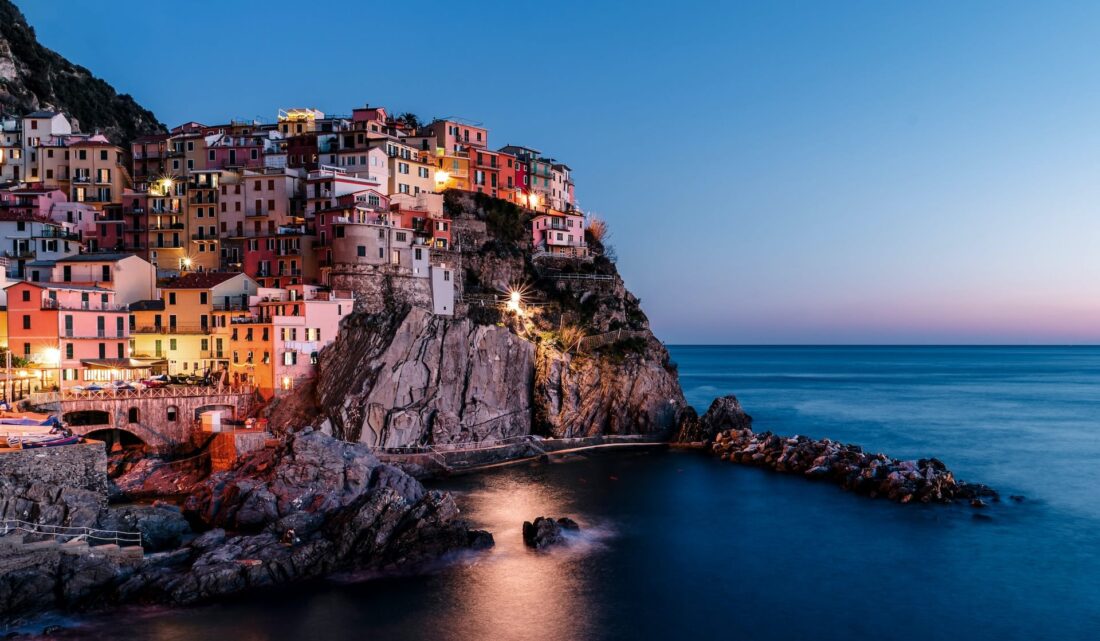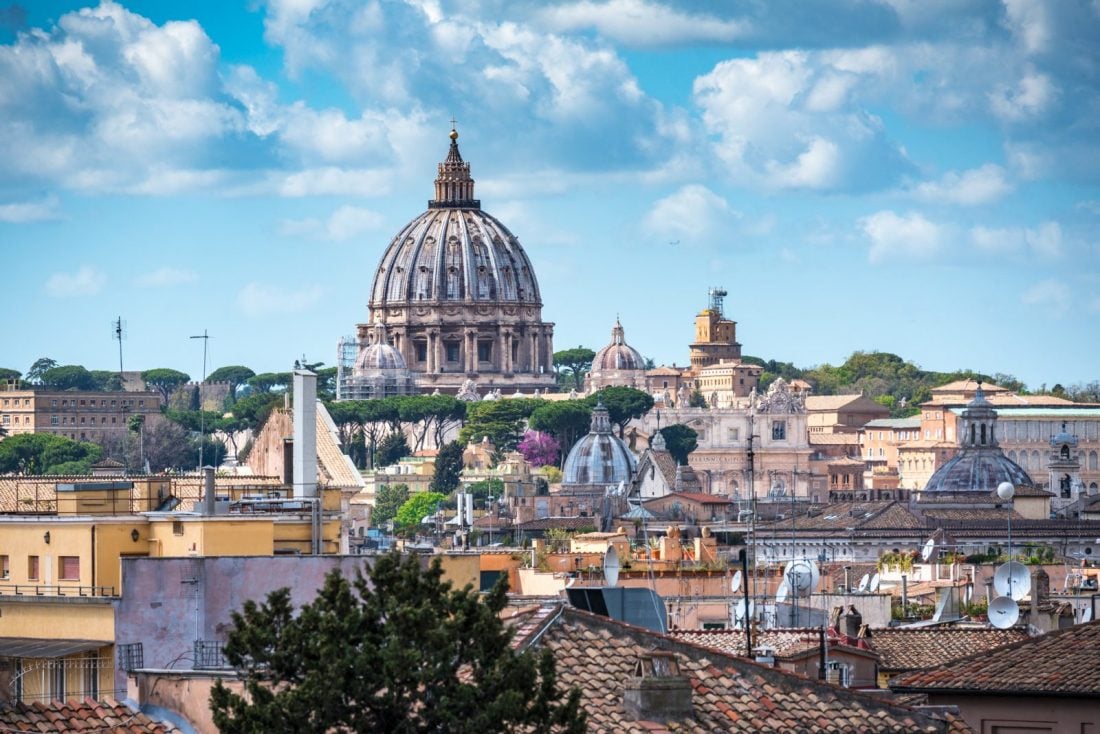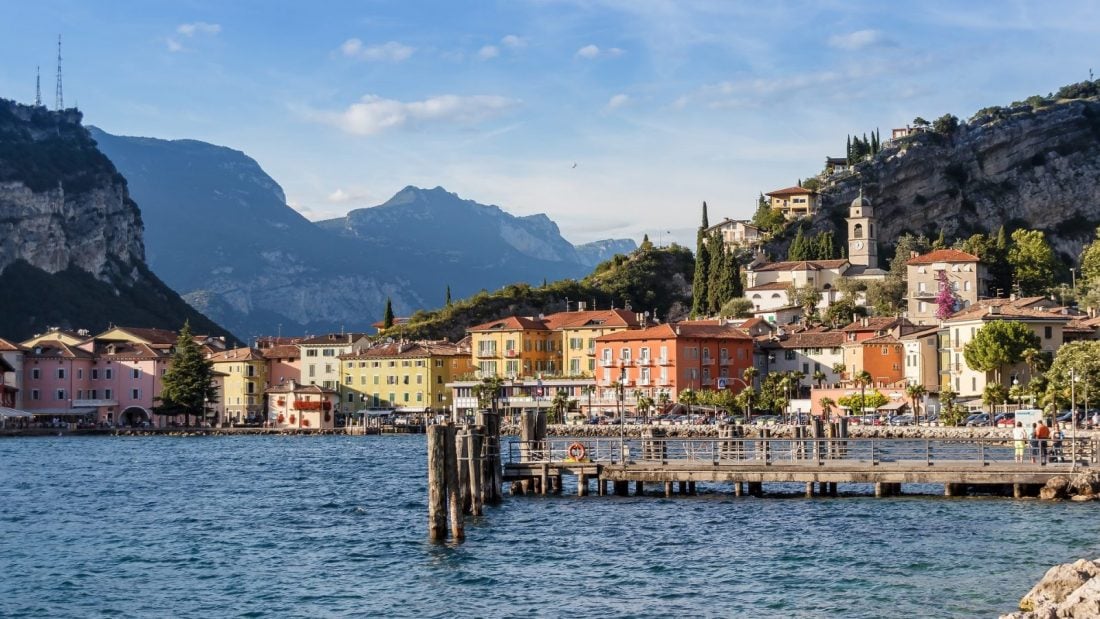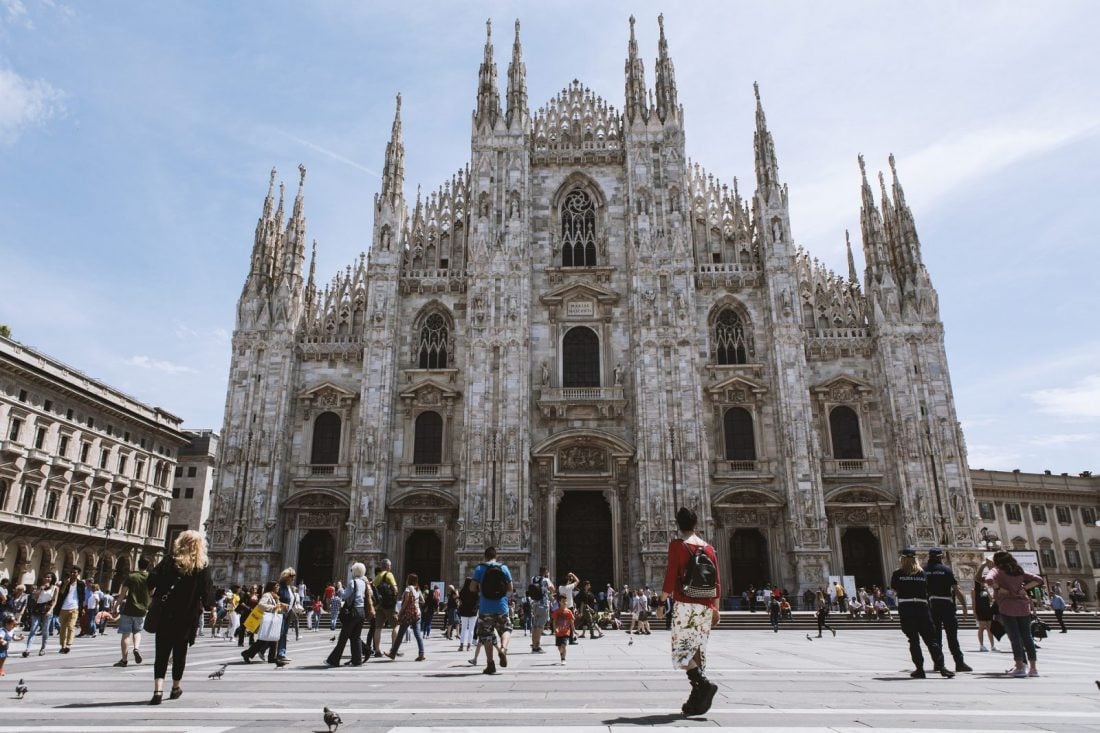Thinking of planning a trip to Italy? Not sure where you begin? No worries, we’ve got you covered.
We’ve visited Italy several times. One thing we know for sure is that it’ll never cease to amaze us. The stunning mountain ranges and alpine lakes in the north. The rolling hills and Renaissance legacy in the center. The cliffside towns, sandy beaches, and crystal clear waters in the south—the list goes on.
Did we mention the delicious food and wine everywhere?
Italy is a country like no other, and we know you’re dying to explore it!
Table of Contents
How to Plan a Trip to Italy in 10 Steps
If you’re wondering how to plan a trip to Italy on your own, you might be feeling a bit overwhelmed. There are so many things to do, places to visit, and pasta dishes to eat—how do you know where to start?
If you’re figuring out how to plan a trip to Italy on your own you’ve got some work to do. Don’t worry, we’ve done most of the hard work for you!
Without further ado, let’s dive into our ultimate guide to planning a trip to Italy.
Please note – Some of our selections contain affiliate links. These allow us to earn a small percentage every time you make a booking. Using our links enables us to provide all the information found on this site free of charge.
Figure out when you want to travel

It’s no secret that Italy is stunning all year round. One of the most difficult things about planning a vacation to Italy is deciding when to go.
Whether hilltop towns are coated in snow or historic cities are bathed in sunlight—there’s no wrong time of year to visit Italy. But, there are some things you should keep in mind when planning an Italian getaway.
First of all, remember that Italy is one of the most popular tourist destinations in the world. We understand why. But that doesn’t make it any less frustrating when cities are so crammed with people that you can barely walk.
Italy in the summer offers endless possibilities. Want to swim in crystal clear Mediterranean waters at some of the best beaches in Italy? Always dreamed of hiking through the lush green hills of the Dolomites? Maybe you just want to slurp a gelato as you marvel at ancient statues and palaces in Rome?

There are just a few downsides:
- It’s busy.
- Prices go up due to huge demand.
- Accommodation can be hard to come by.
Peak periods in Italy run from May to September. Want to experience Italy without the hordes of tourists? We suggest visiting during the off-season (October to April). OK, you might not make it to the beach. But you will spend less time queuing and more time enjoying your vacation!
Here are some things to note when deciding on when to visit Italy.
- Summer can get hot and very humid, while Winter can get very cold.
- August is the busiest month for tourism in Italy.
- Be aware of Italy’s annual festivals, as these might affect your visit.
- Shoulder seasons are often the best time to visit. The weather is mild and there aren’t so many tourists.
Decide where you want to go

Italy’s a big place. It’s also a country with countless historical cities, culture galore, and natural beauty around every corner. So narrowing down your options and choosing where to go can be challenging!
Think about whether you want to take the well-trodden routes or go a bit more off the beaten track. Moreover, consider your interests and travel style and choose destinations that suit you.
Planning short trips
For a short trip, stick to one city or two smaller cities or towns at the most. Every Italian city has so much to see. Be sure to give yourself enough time to explore without rushing.
Ancient history fan? There are plenty of things to do in Rome that’ll be right up your street. Architecture enthusiast? Venice (aka the City of Water) offers photo opportunities around every corner. Art and food lover? Tuscany’s Florence is a mouth-watering must-see.
Planning longer trips
If you’ve got a little more time on your hands, you might consider exploring by region.
There are plenty of incredible places to visit in North Italy to suit nature enthusiasts. Why not embark on a world-class hiking or skiing adventure in the Dolomites? Marvel at the prehistoric petroglyphs of Val Camonica, Italy’s first UNESCO World Heritage Site. Prefer to take it slow? Rent a car and explore the Italian lakes and the picturesque villages that line them.
After all that nature you might be craving some northern city life. Why not explore the bustling fashion capital of Milan? Or immerse yourself in Italian culture in Turin? Ever heard of Venice? There are some cool boats there, too. The north truly offers something for everyone!
What about places to visit in central and south Italy?
The center of Italy is home to the regions of Lazio, Abruzzo, Umbria, Tuscany and Marche. Here you’ll find soft rolling hills, quaint villages, and unique cuisine.
Have you ever been tempted by photos of the dusky Tuscan countryside? A trip to Tuscany should be on everyone’s bucket list! We recommend doing so while sipping on a glass of delicious red wine straight from the vineyard!
Pro Tip: A great way to explore Tuscany is to take day trips from Florence while using it as a base!
You’ll be enticed by the golden beaches, chaotic cities, and warm people that populate the south of Italy.
The south is home to culture-rich regions like Calabria, Puglia, Campania, and Basilicata. You could take a city break in crazy Naples or explore the unique towns of Matera and Ostuni. Looking for sun, sand, and sea? Why not island-hop between Sicily and Sardinia?
We told you! Deciding where to go in Italy is the hardest part! One thing’s for sure, wherever you decide to go in Italy—it’s guaranteed to impress!
Check for visa requirements
Once you know where to go and how much time you’ll need to explore, check the visa requirements.
Citizens of the United States, Canada, the UK, Australia, and New Zealand can travel to Italy for up to 90 days. This applies if the traveler has at least six months validity on their passports. Different rules apply to travelers from other countries. You can check if you need a visa on this website.
Find the best flight deals to Italy
Sourcing the best flight deals can be frustrating when planning a vacation to Italy. With the right know-how, you can easily find the best deals on flights.
Websites like Skyscanner and Google Flights are our go-to when it comes to finding cheap flights. A good idea is to set flight alerts to keep you updated as prices go up and down. This way, you can wait for prices to drop and snag yourself a deal. Try to be as flexible as possible, and wait to book your flight before you commit to accommodation!
If you’re flying within Europe, cheap airlines like Ryanair offer flights to Italy for as little as €10! Don’t expect high-level comfort or any free plane snacks or water. Also, Milan is often cheaper to fly to than other cities in Italy. This is good to note if you’re heading to the north.
Note that certain days of the week are often cheaper than others for flying. In the US, cheap days are Tuesday, Wednesday, and Saturday. In Europe, mid-week flights are often the most affordable due to decreased demand.
Found the perfect flight? Book it—before someone else does!
Pro Tip: Always use an incognito browser when searching for flights. Sneaky cookies can result in prices fluctuating when you’re looking at specific flight routes or travel dates.
Plan your budget

Is Italy cheap? We’d be lying if we said it was. But it’s not the most expensive country in the world. There are ways to travel to Italy on a budget. But if you’ve got the cash to drop, then Italy’s the perfect place to splash out and pamper yourself.
Cost Expectations in Italy
- Accommodation: Accommodation costs in cities like Rome, Florence, or Venice is usually high. If you want to stay near the city center, a budget hotel can cost up to €100 per night. In smaller towns, hotels or agriturismos are typically much more affordable (approx. €40 per night). A great way to save on accommodation costs is to stay in hostels. You can even find private rooms in hostels at cheaper rates than hotels.
- Food and drink: Great food and even better wine are ingrained in Italian culture. Luckily, this high-quality isn’t reflected in the price. You can still eat out at a great restaurant in Italy without breaking the bank. Avoid tourist trap restaurants in the bigger cities. Often, you can end up paying an arm and a leg for a mediocre experience. Instead, ask locals for recommendations or seek out traditional restaurants.
- Transport costs: Public transport in Italy is relatively cheap in the big cities. Buy a tourist travel card for the duration of your trip. Better still, save those transport costs and walk! Exploring on foot is always the best way to discover a new place! When it comes to traveling between cities, you’ll find agreeable rates for trains and buses. If you book in advance you can often find cheap deals.
- Cost of visiting attractions: This depends on where you decide to go. For instance, a Gondola ride in Venice can cost you over €100. On the other hand, you could spend a whole day exploring the ruins of Pompeii for €14.50. Ask the tourist information whether there’s a city pass available. These allow you to visit the most important landmarks, attractions, and museums in a city at cheaper rates. What’s more, check each attraction’s website to see if they hold free entry days.
When planning your budget for Italy, always overestimate for added security. Be sure to consider travel insurance costs and —of course— gelato when planning your budget.
Organize your accommodation
Italy is brimming with accommodation options. There are options to suit every budget.
You can expect to find the usual range of luxury and budget hotels, apartments, B&Bs, and hostels in most Italian cities.
Organizing your accommodation depends on your budget. Embarking on a romantic weekend getaway to Rome? You might want to check out our guide to the best luxury hotels in Rome. Backpacking around Europe?
Need to be as frugal as possible during your pitstop in the fashion capital? There are plenty of great hostels in Milan to suit a budget backpacker’s needs.
In a city like Venice, you might consider staying outside the city center to save on accommodation. There are plenty of affordable hostels in Venice along with boutique hotels.
When choosing your accommodation, it all depends on your travel style. If you prefer privacy and creature comforts—hotels are the way to go. Alternatively, hostels are a great way to meet travel buddies and sleep for cheap.
We look to Booking.com and Hostelworld when we need to find great accommodation options.
Plan how to get from A to B when you arrive

The best way to travel between cities and towns in Italy is by train. When you book ahead, you can usually find cheap deals on high-speed train tickets. The trains are usually comfortable and (mostly) on time. Trains run regularly between most large cities. There are also high-speed trains between all the major cities. With a high-speed train, a trip from Milan to Rome takes just 3 hours!
Check Trenitalia and Italo for the best deals on train travel in Italy.
You can also travel by bus. This is often cheaper than train travel but usually takes much longer. Night buses are a great way to save on travel costs if you’re backpacking. You can make the long journey from Venice to Naples, for example, and sleep the whole way through! We recommend checking out Flixbus for cheap bus travel tickets.
Another option is to rent a car. This way you can travel on your terms and visit places that are off the beaten track. Remember that to rent a car in Italy requires an international driving permit. You can organize to get on in your home country at little cost.
Choose major attractions to visit

If you’re visiting Italy’s biggest cities, you should plan ahead of the attractions you want to see. Of course, you might discover other lesser-known ones when you’re there. Especially if you’re traveling during high season, buy ahead or book your tickets. This way you’re not stuck waiting in hour-long queues in the sweltering heat!
Below are some of the best things to see in Italy’s most renowned cities and links to buy tickets.
- Rome: Book ahead for visits to the Colosseum and the Vatican Museums.
- Florence: Save time queuing at the Uffizi and Accademia Galleries.
- Venice: Skip the line at San Marco’s Basilica and don’t miss out on a day at the Guggenheim Museum.
- Milan: You’ll need to book well in advance to secure a ticket to see Leonardo da Vinci’s The Last Supper at the church of Santa Maria delle Grazie.
Find what and where to eat
You didn’t think an article about Italy would be complete without talking about food, did you? Prepare to be hungry.
Trust us when we say that Italians take food very seriously. Tell a Roman local that you’ve never tried a dish of spaghetti alla carbonara and you might be kicked out of the city. Food is (almost) everything in Italy.
Each region of Italy offers a unique cuisine with distinct flavors, ingredients, and cultural significance.
If you’re heading to Milan, don’t pass up a dish of aromatic risotto alla milanese. Stopping off in Bologna? You can’t leave without trying ragù alla bolognese. Heading to Napoli? Try a real Neapolitan pizza (pizza will never taste the same again!) Top it off with a sweet cannolo (cannoli, plural) from Sicily and wash it down with a Venetian Aperol spritz. Save the diet for when you’re home. You won’t regret it.
Take a look at this great Italy food map for some more mouth-watering inspiration.
The best way to find out where to eat? Ask the locals! They’ll help you to discover the best restaurants and street food spots while avoiding the tourist traps.
Otherwise, stay away from restaurants and cafes right in front of tourist attractions. They’ll usually hike the prices up and won’t deliver the true experience of eating Italian. Instead, head down side streets and discover where all the locals are eating.
Start packing!
Once you’ve got the details sorted, it’s time to think about what to take with you. Of course, this all depends on the time of year you’re traveling.
As we mentioned before, Italy gets hot in the summer and cold in the winter. If you’re visiting in summer you can probably get away with taking a light jacket. But if you’re planning to go to the countryside, we recommend something a bit heavier.
Embarking on an Italian winter escape? Take lots of layers and a good jacket. If you’re planning on hiking, a good pair of hiking boots and the right equipment is a must.
It’s a good idea to take a power bank. This way you have a backup if your phone runs out of battery before you make it to your hotel. Also, pack an international adaptor when heading off on any international trip. This way, you won’t be surprised when you arrive at the hotel at midnight to find a different socket shape!
Oh, and don’t forget your camera!
We hope this guide has helped you to answer any questions you had about planning a trip to Europe. Remember that no matter how much time you spend organizing and planning, you can’t predict everything. Traveling is about experiencing new places, meeting new people, and learning about yourself. So go with the flow, always.


















